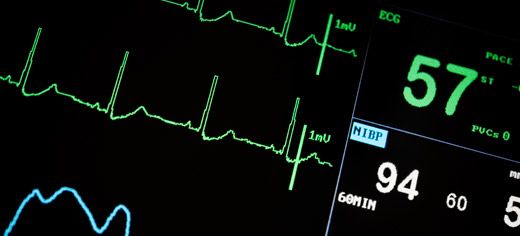
People are more likely to survive a heart attack if they have an electrocardiogram (ECG) in the ambulance on the way to hospital, research by the University of Leeds has shown.
The research, carried out with colleagues at the University of Surrey, showed that the number of patients who died within 30 days of hospital admission was significantly lower when an ECG had been carried out by ambulance crews.
An ECG is a simple test which records the rhythm and electrical activity of the heart.
Patients who did not have an ECG in the ambulance were much less likely to receive treatments to reopen a blocked coronary artery. The use of this treatment is proven to reduce heart damage and improve the survival of patients.
Dr Chris Gale, Consultant Cardiologist and Associate Professor in the School of Medicine at the University of Leeds, who co-authored the research, said: “The wider use of this simple, cheap and easy-to-perform test in patients suspected of having a heart attack, before they reach hospital, has the potential to save many lives and prevent premature cardiovascular death.
“If performed by ambulance staff before reaching hospital, the ECG enables patients who are having a heart attack to receive life saving treatments much earlier. Moreover, patients with a heart attack who do not receive a ECG are less likely to receive emergency treatments on time and are more likely to die.
“This study has identified an opportunity to provide a low cost easy-to-deliver test that will improve national cardiovascular care and outcomes.”
The study, published in the journal Heart, also revealed that a third of patients admitted to hospital with a heart attack are not having the test in the ambulance, with certain groups of patients, including women, the elderly and people from black and minority ethnic groups, less likely to have an ECG.
The researchers, funded by the British Heart Foundation (BHF), analysed data from almost half a million adults admitted with a heart attack to hospitals in England and Wales, noting whether patients who came to hospital by ambulance had had an ECG test or not.
Lead author, Professor Tom Quinn from the University of Surrey, said: “Every NHS ambulance is equipped with an ECG machine. While there is evidence from other countries that having an ECG test in the ambulance leads to faster treatment, our study is the first to determine that the test is actually associated with improved survival after a heart attack.
“Ambulance services in the NHS compare favourably to countries such as the USA, where only a quarter of such patients get an ECG, but we need to do more to ensure that the groups we identified as not getting the test have improved care.”
Dr Mike Knapton, Associate Medical Director at the BHF, said: “The results, made possible by studying huge numbers of medical records, clearly support existing guidelines on using an ECG test before patients reach hospital. So it’s vital that all patients who show signs of a heart attack have this simple test.”
Further information
Copies of the research paper, "Effects of prehospital 12-lead ECG on processes of care and mortality in acute coronary syndrome: a linked cohort study from the Myocardial Ischaemia National Audit Project", by Quinn et al, are available from the Press Office.
Dr Chris Gale is available for interview. Please contact Ben Jones, Press Officer, University of Leeds on 0113 34 38059 or email B.P.Jones@leeds.ac.uk